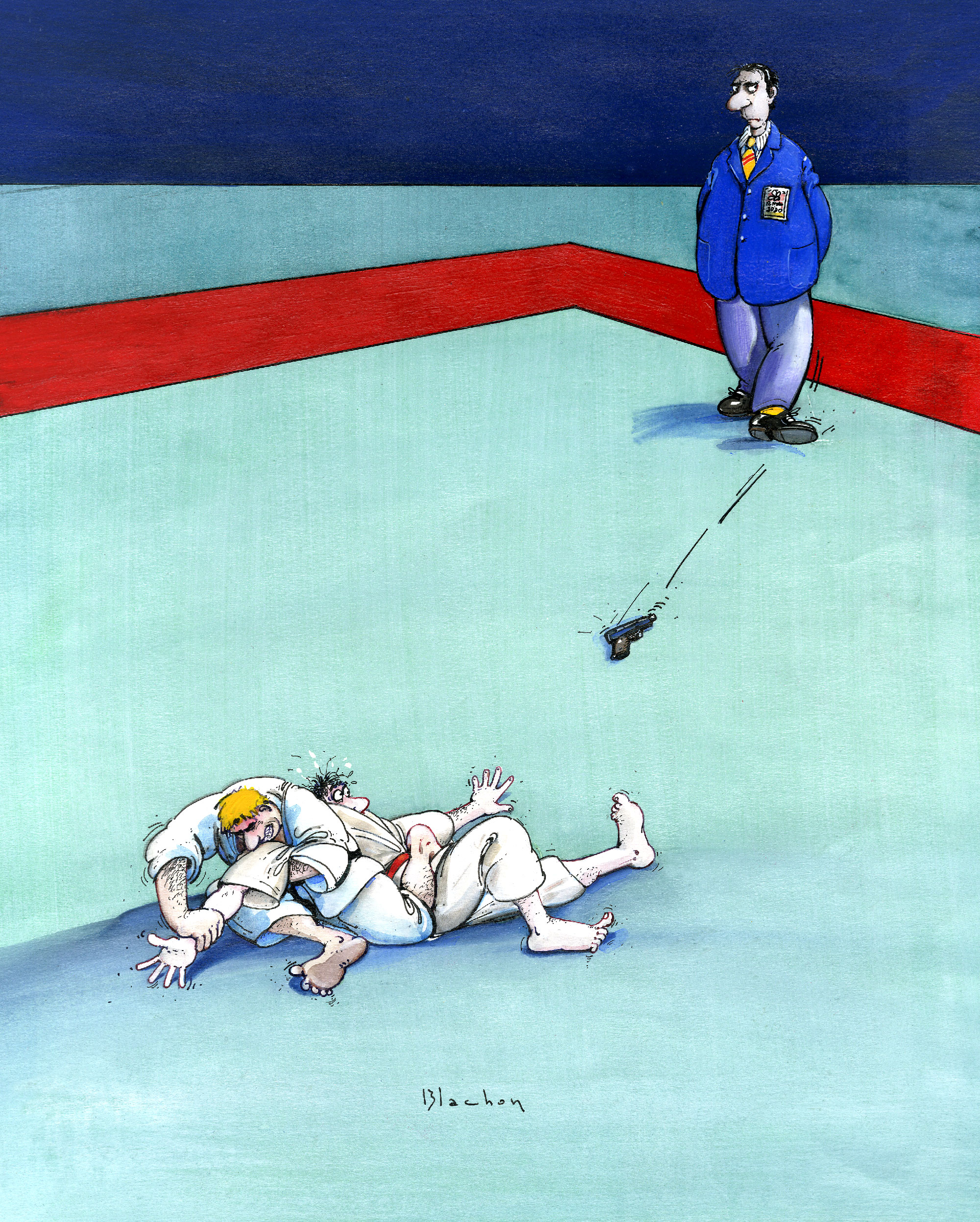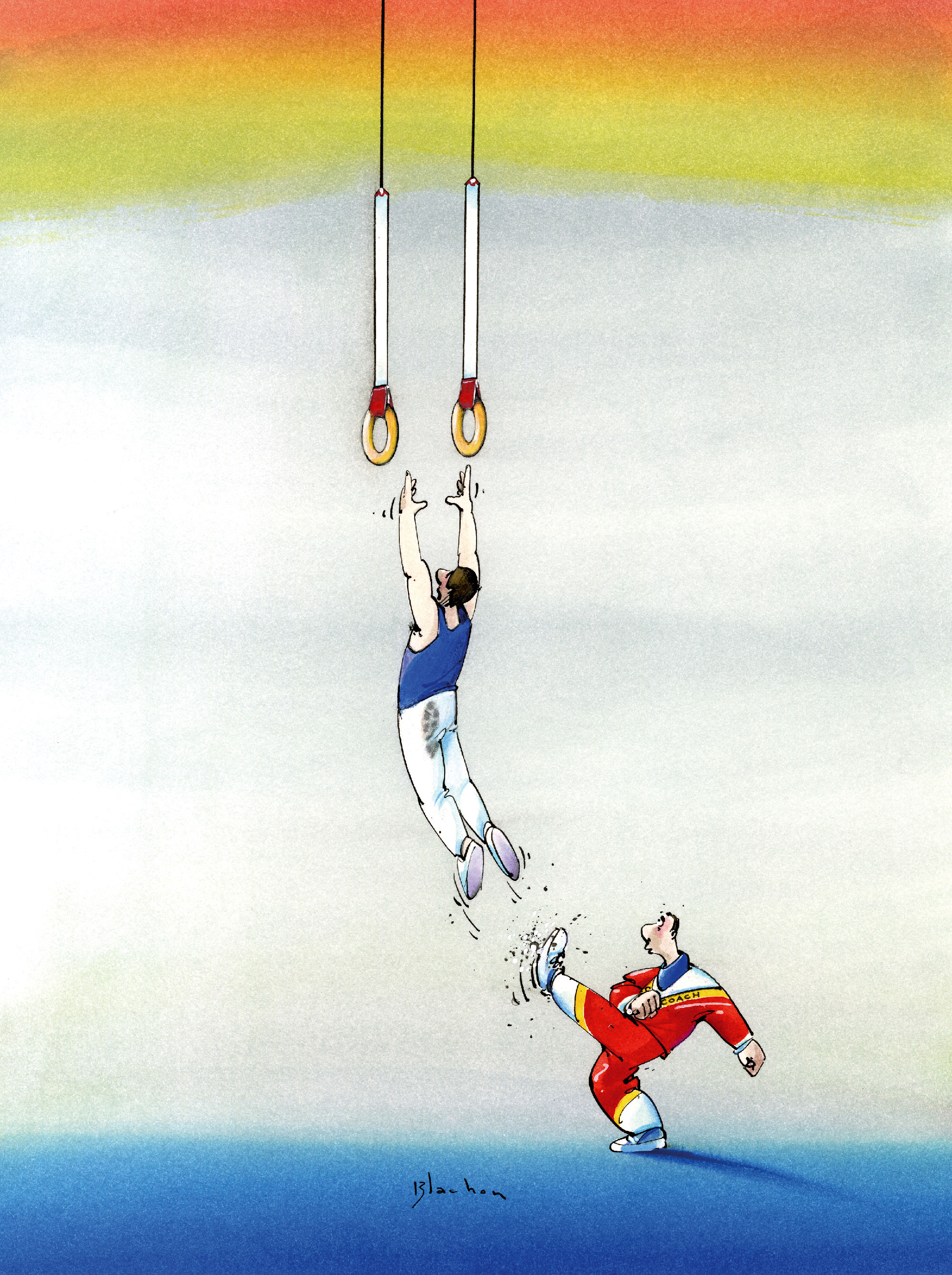

copyright:M. Blachon

WO: I once heard a well-known athlete say: „If you need to convince your child to go to practice, you have to wake them up, help them get dressed and so on, they will never be an athlete. Let it go and focus on something else.”
Kuba: I was a teen and all I could think about at 2 p.m. was that I had practice at 6 p.m.
Szymon: Practice was the most important part of the day.
Tomek: I remember senior year in high school, it was the hardest time for me. I was in school until 3 p.m., then I went to a very advanced English-language course, which lasted until 7.30 p.m., and after that I went to team practice from 8 p.m. till 10 p.m. This is what my days were like four times a week, and then I had the game every weekend. There was no substantial gain at the time, other seniors did lots of things in their free time, and I was busy four times a week until 10 p.m. The weekend games, which often involved travel, broke up my weekends. This went on for years. Money is an effect you can wait and hope for if you do well, but it doesn’t come all on its own from the beginning.
WO: Let’s talk about a sports team and how it’s organized. How do you build teams? Some of you watch how young people practice, how a class performs and the team within the class, this in turn leads to your evaluation of who takes on what roles on the team. Do you have a recipe for success, or do you work based on intuition when building a soccer team, or any other?
Kuba: The first factor we look at is involvement, engagement, and the will to work – this is ninety percent of a successful team. Having a star on the team is not key, what you need is people who are built to work hard. Success is when you have a mix of people who work hard but are also predisposed to being team players and functioning well on a team.
Michał: We observe the sports market very closely, as you do in any business. We know where we are. We support our collaboration with partners and sports clubs. Of course at times we risk a lot, because we have our own thoughts on sports clubs we would like to work with. We know this collaboration will not always be easy, but we work to find solutions that will show our partners the benefits of working with us.
We also fail sometimes, we need to part ways with some clubs we had worked with, so we look for new partners, like in any business. We pass on our philosophy – we tell people how we want to build the school to make sure it works as best it can, what is important to us and what our values are, we tell people we don’t run a factory but an institution that works with young people, kids. We don’t want to collaborate with those who don’t look at things as we do. Unfortunately, in the world of sports there are still lots of people who only look at grants that can be won, and points that can be gathered to get more money in the end. We want to have a team that may even be a bit weaker in some discipline, but that is built from scratch according to our standards and beliefs, not according to what someone else wants. We have a very consistent vision of what sports in the Gortat schools should be like, and we try to stick to our rules when recruiting clubs and people – there are values behind what we do.
WO: In extreme situations, like the army, the Navy Seals, people believe that team members’ thinking should go in the following order: the mission comes first, then the team, and the ego comes last. Do you also think this way? Do you believe that thinking within a team, in this order, is the best way to go? First the mission, then the team, finally the ego?
Kuba: The order you mentioned is great, of course. I think we do it exactly this way, intuitively. No one on our team has a huge ego, there is no one person who puts themselves before the mission or the team, we’ve never had this problem. I think we implemented this model precisely because we all think this way, and we try to organize our values in this particular order.
Tomek: We go back to the basics because we’re athletes, and sports are like the army. Mission, team, ego at the end. If someone is unable to be a team player, they can play table tennis or practice martial arts.
Kuba: Someone organized things very well, and we are very happy to be doing things this way.
WO: What about new members? What’s the role of other team members and the coach in recruiting new people for the team? You all say the team is important: one person disappears from the Real Madrid team and there is no championship, and no one knows why the dynamic changed. How do you build new teams?
Szymon: Often it’s intuitive.
Kuba: I think we are not a typical business that recruits in the standard ways – we don’t advertise and look for employees. We built this company basing it on a group of people whom we’d known for years.

copyright:M. Blachon
WO: The need to succeed, sometimes at all costs, is related to ambition in sports, with the need to compete. How is it that you are able to convey, and maintain, the belief that sports has its rules, that fair play is rewarded? I know that the determination to win, especially in professional sports, is very strong, and it’s difficult not to cross the line; I assume this is part of a sports education. What is the role of fair play in sports?
Michał: I am sure that for us this is the most important issue, and we have no trouble with players crossing that line. In the four years of managing the school I don’t recall having a dilemma along the lines of whether it is better to play fair and lose, or break the rules and win. We tell the coaches, the clubs we work with, and the players this all the time – there is a line we do not cross.
WO: I ask you as teachers: you see two teams of young players who want to win at all costs, and you see that something is not going in line with the rules.
Kuba: There are two levels of fair play as we understand it. One is that doping, taking substances that help you develop your body faster, all these types of activities go against the rules of fair play – this goes without saying. But there is also a second aspect to playing fair: there are two teams on the playfield and three, four judges who are running the game who have different approaches to teams. I come across this often in basketball – there is something called a “good foul”. How do we approach this? Well, there is a limit, one player can foul five times in one game. Sometimes he needs to use these fouls to stop an action, for example.
Michał: But this is part of the game.
Szymon: Yes, but not all parents understand this. They ask us about this more and more often – how is this possible? How can the coach be convincing my child to practice foul play during the game?
Tomek: For me there is no discussion on this: it’s as if we were to prevent players from fouling in handball, when allowed fouls are simply part of the game


copyright:M. Blachon
WO: What is the coach’s role in making individual players and the team better?
Szymon: A coach is a teacher first of all.
WO: And a friend?
Szymon: He can be, but doesn’t have to be. He has to be a teacher and leader, needs to win the team members’ trust. I think he also needs to be a good psychologist. You can yell at a player and this approach will work with one, but not with another, with whom you need to talk in a calm way, give him some praise and positive feedback as well. Can he be a friend? At the beginning, when I met Kuba, I called him “Mr. Jakub”. He’s my employer, he is on a higher level than I am, so I feel respect. But it’s also a friendly relationship. During a game there is a different coach-team member dynamic. We use the terms “coach” and “player”.
Szymon: The same goes for work, for business.
WO: Michał, how do sports influence the job of school principal? Are you the boss, or part of a team?
Michał: I always considered the coach a great authority figure, even though when I first started playing my coach was 25 years old, he must have just graduated from university, it was probably his first or second year on the job. For me, as for the whole team, he was someone who knew everything there was to know about basketball. He watched NBA games, which to us were something out of this world, he had uniforms sent over by friends from the U.S.A. From the very beginning he was a great authority figure, even though when I think about it today he didn’t have a lot of experience or authority in the world of coaching.
WO: You see a player who does something different to what you planned during the game. You talk to him after the game and he says “but I thought of something new and it worked, I won”. How do you, as coaches, react? Do you introduce this new element in the game, or are you against it because it was not in the original plan? How do you perceive innovation that comes from the team?
Szymon: If this new element works and the team is successful, we are happy. If the person who thought of something new is creative, I think they should be given the opportunity to create. If the point guard invents unusual plays let him develop and grow, especially in junior leagues. In senior sports, when big money and huge pressure come into play, or when it’s the representative team, in my opinion there is no room for creativity, it can cost the team too much. However, if I stop the growth of creativity in a thirteen or fourteen year-old player he will stop developing.
WO: Do you allow for risks? For changing plans mid-game?
Szymon: For risks – yes. The fact that a given player find himself in a particular situation means that he can do something that another person would not do.
Kuba: Going outside the box means that you take the risk upon yourself.
Tomek: You take the risk upon yourself and because you know you are the best, you are able to achieve what you planned. I think that in order to achieve success you need to break out of the box sometimes. This is what happens when the best player gets the ball in the last seconds of the game and if he fails, he takes the responsibility for his decision. LeBron James won a game because he scored a tie, blocked, and then scored a win. One person, one individual, won – he is the best in the world. This is something you can’t plan, it’s impossible to plan a throw and a block.
Kuba: It’s a matter of statistics; teams write them out to know what play to make at a given time.
WO: And what about observing the competition?
Kuba: Even in junior sports, with eighteen year-olds playing basketball in Poland, this works. The coach is prepared and before the game he shows everyone the schemes the opposing team is using. He looks for the other team’s weak points, and for the elements they use most frequently. A goalie who is going to defend a penalty shot in handball is told how the player he faces threw penalty shots in the past and how he might throw now, how he reacts under stress, in cases when one usually resorts to what one does best.
WO: So it’s a standard…
Szymon: The goalie is told that the likelihood is 68 percent that the opposing player will throw in the upper right hand corner. So I think that system of checking out the weak points of your opponents, analyzing their schemes, and finding out how they react in stressful situations proves that sports came first and led the way, before business models were created.
WO: How do you find your best talents, and how do you then develop them? You see someone who played out of the box, and that’s your cue? Or do you watch their growth path over a period of time? Also, do you focus on growing individual talents, or only teams?
Szymon: We care about the whole team, and talents always appear on their own. You can scout for talented players, go to school games, look for boys for the team. You can spot talent right away: a boy is nine years old, but he can throw three-point field goals and perform jump shots extremely well. But then once he is on the team I don’t treat him in any special way because he is talented, I treat all players equally. How would the others feel if I played favorites and kept setting the leader as an example? Everyone is treated the same. The one thing I can do is give him more difficult tasks during practice, because what is easy and natural for him is difficult for other boys. In order to grow talent you need to create challenges, expect more and more.
Kuba: This is precisely why the most talented players don’t become coaches – they had it easy since they were nine years old. They tried something twice or three times and had it down pat.
Michał: But at the school we look for talents, of course. Coaches travel to games, observe players. We are trying to grow the business. We have four schools throughout Poland, we exchange information, encourage players to develop their talent with us. When someone joins our team we then work on making sure they stay with us; we organize both their sports education and their regular education in a way that will help them grow and develop.
Kuba: You need to be very vigilant in junior sports because talent can emerge quite late. Marcin Gortat is a great example: he started playing when he was seventeen years old, which is very late for a basketball player. I am not sure, I’d need to check, but he may be the only player in history who started playing at seventeen and then found himself in the NBA. But on the other hand there have been many players who developed their talent and skills very fast, everyone thought they would have great careers in sports, but that didn’t happen, one of them works at a gas station now. They developed faster, had been physical capabilities, had talent, but at some point they stopped growing.
We spoke as a team:
Michał Feter – principal of the Gortat School in Łódź for the last 4 years. Previously, for 10 years Michał worked as a coach and management advisor (including project management), and was responsible for obtaining outside funding for projects, evaluation, and coach competencies. He is the author of over 200 grant projects. From an early age he has been fascinated by sports. Spain is his hobby.
Szymon Nowak – occupational therapist, teacher and publicist by education, who has been active in volleyball all his life. He loves working with people and for the people. Before joining the Gortat School he worked for the Dziewczynka z Zapałkami and JiM Foundations. At the School he is responsible for marketing and for the growth of the volleyball project. Coordinator of the Gortat School Business Club. He does what he loves by working in the field of sports.
Tomasz Solarek – graduated from Łódź University with a degree in English. Used to play basketball for ŁKS and Łódź University. Worked for 7 years for the Marcin Gortat MG13 Foundation, where he was responsible for coordinating the Marcin Gortat Camp project. Currently works for the Gortat School and Gortat School Business Club. Responsible for collaboration with American colleges to provide sports scholarships in the U.S.A. for Gortat School students.
Jakub Urbanowicz – graduated from the Łódź University of Technology with a degree in Management. Used to play basketball for ŁKS and and the Łódź University of Technology. Responsible for the development of Marcin Gortat Schools in Łódź, Kraków, Poznań, and Gdańsk. Co-creator of the Gortat School Business Club. President of the ŁKS Male Basketball Association.
Waldek Olbryk – Believer in the development of organizational culture through working on aspects that can influence it, based on the client and user perspective. Believes in the concept of “life-long learning”. Loves the P2P (people2people) approach in everything that is related to business – even in the area of pure B2B (business2business). Open to exchanges between cultures and sectors. Created the concept and co-organized discussions between artists, businessmen, and academics organized at the SOUNDEDIT 2017 festival in Łódź. Admitted to the Royal Society for the Arts, Manufactures and Commerce in 2018. Currently works as Board Member of Echo Investment S.A. For over 20 years he has been active in the real estate sector in Poland, working for companies such as BP, Apsys, Philips, and Skanska.
Look for others inspirations, interviews? Go for p2v